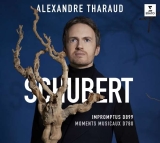Das Programm von Alexandre Tharauds erstem Schubert-Album umfasst die vier Impromptus D 899, die sechs Moments musicaux und – in Tharauds eigener Transkription für Klavier – vier Auszüge aus der Bühnenmusik zu Rosamunde.
Von den vier Impromptus D. 899 gibt es mehr schlechte als gute Interpretationen. Die Poesie und den Charme dieser Kompositionen zu wahren, sie nicht aufzubauschen, um mehr daraus zu machen als sie sind, ist die Herausforderung an den Interpreten, eine Herausforderung, mit der viele nicht fertig werden. Dem Franzosen Tharaud ist das ausgezeichnet gelungen. Sein Spiel ist locker, kantabel, voller Delikatesse. Er zieht die kleinen Werke wie Perlen liebevoll auf ein Band. Er erreicht mit vielen guten Ideen und einem spontan wirkenden Rubato einen erstaunlichen Grad an Lyrik, genauer gesagt, rhythmischer Lyrik, die in Verbindung mit der Einfachheit des Ausdrucks Wunder in diesen Stücken wirkt, die einmal in einem völlig anderen Licht gesehen werden können als dem, an das wir gewohnt sind.
Auch in den Rosamunde-Transkriptionen fällt die frische Rhythmik auf, die in Verbindung mit Kantabilität für inspirierende Momente sorgt.
Sehr schön und anregend ist auch die Interpretation der Moments musicaux D. 780). Tharauds Gespür für Farben und klangliche Abstufungen, seine fein gesteuerten Tempi und prägnant akzentuierte Rhythmen macht aus den sechs Stücken berührende Stimmungsbilder.
Ein weiterer Pluspunkt ist die Aufnahmetechnik die ein sehr natürliches Klangbild besorgt hat.
The program of Alexandre Tharaud’s Schubert album includes the four Impromptus D 899, the six Moments musicaux and – in Tharaud’s own transcription for piano – four excerpts from the incidental music to Rosamunde.
Of the four Impromptus D. 899 there are more bad than good interpretations. To preserve the poetry and charm of these compositions, not to puff them up to make more of them than they are, is the challenge to the performer, a challenge that many cannot cope with. The Frenchman Tharaud succeeded admirably. His playing is loose, cantabile, full of delicacy. He lovingly pulls the small works like pearls on a ribbon. He achieves, with many good ideas and a spontaneous rubato, an astonishing degree of lyricism, more precisely rhythmic lyricism, which, combined with the simplicity of expression, works wonders in these pieces, which for once can be seen in a completely different light than the one we are used to.
The fresh rhythms in the Rosamunde transcriptions are also striking, and combined with cantabile make for inspiring moments.
The interpretation of the Moments musicaux D. 780) is also very beautiful and stimulating. Tharaud’s feeling for colors and tonal gradations, his finely controlled tempi and concisely accentuated rhythms turns the six pieces into touching atmospheric pictures.
Another plus is the recording technique which has provided a very natural sound.
























